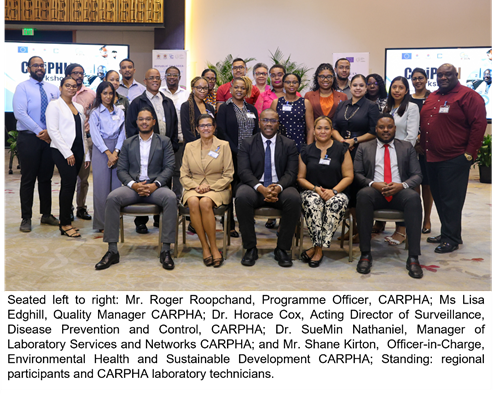The Caribbean Public Health Agency (CARPHA) organized a crucial hybrid meeting for the Caribbean Public Health Laboratory Network (CariPHLN) on August 12-13, 2024, at the Hyatt Regency in Port of Spain, Trinidad and Tobago. This event, supported by funding from the Republic of Korea through the Republic of Korea – CARICOM Cooperation Fund and the European Union (EU), gathered national laboratory leaders, managers, and specialists from fifteen CARPHA Member States.
Dr. Horace Cox, CARPHA’s Acting Director of Surveillance, Disease Prevention, and Control, underscored the importance of the gathering, stating, “This meeting is pivotal to our ongoing efforts to reinforce the laboratory networks within the region. By uniting laboratory professionals from across our member states, we are addressing current challenges and establishing a stronger, more adaptable public health infrastructure.”
The primary objectives of the meeting were to assess the current laboratory capabilities of CARPHA Member States, identify gaps, and discuss strategies for developing regional laboratory hubs. The participants also focused on integrating advanced diagnostic technologies and reference testing methodologies. A key achievement from this meeting was the creation of Technical Advisory Groups (TAGs) dedicated to specific areas such as Antimicrobial Resistance Testing, Sample Transportation, Food and Environment, and Genomic Expansion and Surveillance.
Dr. SueMin Nathaniel, CARPHA’s Laboratory Manager and Officer-in-Charge of Laboratory Services and Networks, highlighted the significance of these TAGs, noting that they are instrumental in guiding expert decisions, fostering innovation, ensuring quality, and enhancing the region’s capacity to respond to public health crises. She stressed that these initiatives would lead to more collaborative, efficient, and impactful laboratory services.
Additionally, the meeting resulted in the revision of the CariPHLN organizational structure, updates on improved laboratory capabilities within CARPHA Member States, and the selection of key Member States to act as regional testing hubs.

